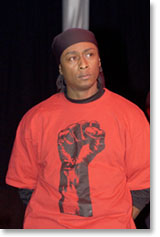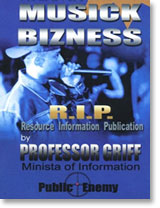FCNNEWSSOURCE


(FinalCall.com) – Professor Griff is no stranger to true fans of hip hop. As the leader of the S1W unit of the rap group Public Enemy, Professor Griff exemplified the revolutionary spirit, committed focus and high level of consciousness which existed in hip hop during that time. Often controversial and never one to hold his tongue, Professor Griff spoke with Final Call Online Correspondent Ashahed Muhammad sharing his views on reparations, the current state of the music industry and upcoming projects.
Final Call (FC): First of all, it’s good talking to you after all of this time. What types of things are you involved in right now?
Professor Griff (PG): The one thing that takes precedence is I am involved in the next Sesame Street, but with a hip hop theme. I created a theme called Kid Hoppaz. I designed some characters that actually do rap songs and speak to some of the things that children need in their growing stages. We deal with certain themes in the songs. We wrote stories and we’re trying to bring it to life as far as doing live shows and ultimately a television program.
FC: How did that idea originate?
PG: It originated basically with me driving back and forth from North Carolina to Atlanta with my children in the backseat, listening to them sing songs that they hear on the radio. There’s no real music out there for children. You look for music for children, especially Black children, you would definitely have to go to music that White people make, that’s catered towards and that deals with subjects that their children may deal with, and arrange it in a way that our children would understand these things.
Basically, what I did was, I just put stories and I put lessons to music. We learn in rhythmic patterns anyway, so I just took a subject like “Respect”–“Respect your parents,” “Respect yourself,” you know, “Respect everyone around you” and just put it in a song form on a level in which two to seven-year-olds can understand, but in a real kind of way.
FC: CD and audio tape, or are you going video with it? Is it going to be on television?
PG: I wrote the stories, wrote the songs, recorded them, designed the characters, got a video production that I’m working with, got an illustrator that I’m working with and we’re trying to bring it to life, for ultimately video and DVD.
FC: I heard that you had a new album coming out.

PG: I finished my last album about four months ago. I have an album that’s coming out, called The 7th Degree, with a band I put together called the 7 Octaves. I got tired of rapping over the loops and beats and the drum machines. I just took it live. Not only that, my last album came out in 2001, September 11.
FC: “The Word Became Flesh.”
PG: Right. The album after that was the “Revolverlution” album, with Public Enemy, and that was July 2003. So, there’s material out there. A lot of times, you know, with us, if it ain’t in our face on TV, BET or MTV or on the radio, people will run into you and ask you, “So, what you been doing? I haven’t heard from you in a while.” But it’s actually out there. I’ve done a couple of songs for a couple of movies. I’ve done a couple of songs for some video games.
FC: In your lyrics, you always inject much-needed consciousness into the minds of the listening public. Most music, in general, is lacking any type of material for your brain, and with hip hop in particular, that is also a problem. What has kept you from going the easy commercial route even if it means that the major distributors might stay away from you, resulting in lower record sales?
PG: Having come into the music industry with the knowledge of self and being a Muslim in the Nation, it’s like, there’s just certain things that are already instilled and in place with you, that you can’t feed your people on the physical level, but on the spiritual level. And I know and understand that the airways are sacred. I do believe in karma and that stuff, that kind of stuff comes back.
I’m not going to be foolish enough to get on the airways and write a song and use my pen to write some foolishness and then hope for the chance that this stuff gets out and reaches the ears of young people and destroys the spirit in them and destroys their minds. That’s death and destruction. I don’t want any part of that. I don’t care how much these cats are getting paid. I believe in something a whole lot higher than the music industry or than a few fans and some chump change. I know and understand that I’ve got to go before the Lord of the Worlds in the Last Day and I know I’m not going to be able to explain that. I refuse to lend my talents that were given to me by the Creator to put some filth out, some nonsense.
FC: What do you think is the biggest challenge facing hip hop today in becoming more culturally relevant, other than making people buy Hennessey or making people buy this particular type of watch or trying to drive a certain type of car?
PG: I think the biggest challenge is them actually facing a devil, in which The Honorable Elijah Muhammad always taught us, truly exists. When you’ve got to meet and deal with a real God and a real devil, while you’re living, that’s much (more) difficult to do. These guys don’t figure that there’s going to be no direct punishment for this. As long as you don’t say anything positive for your people, to uplift the conscious level of your people, the devil will leave you alone and reward you. Which is sad, and I think we need to understand this, I call it “hidden in plain sight.” It’s almost an unspoken kind of thing nowadays, in the music industry. If you talk about negativity, if you deal in negativity, keep your people deaf, dumb and blind, the devil will reward you. Then, we’ve got conscious people who are in key positions that won’t even say anything.
FC: Several months ago in Atlanta, you were there when Minister Farrakhan recently spoke. He was supposed to speak at Morris Brown and because of pressure from outside forces, the venue was moved to the Hyatt, and it was still packed with an enthusiastic crowd. Minister Farrakhan addressed reparations and the inordinate control over the education of Black students. What are your thoughts?
PG: Rally up the forces, talk to other hip hop artists about at least pushing the reparations agenda before the hip hop community, therefore pushing it before the world, because hip hop is global. It was that spirit that the Minister had that “Public Enemy” used to take and put in the songs, because that was our core.
If (we) weren’t linked and plugged into the Nation, how do people think that we did this? This was done with the spirit of the F.O.I. and the M.G.T., the spirit of the Minister, the Spirit of Allah, and galvanizing that energy and putting it into the writing and the production with our people in mind.
So, what I heard in the Minister that Saturday was almost, “Ok, this is going to be a fight. And if you’re not prepared to take on this fight, it’s best for you to just back up, put your little cheerleading skirt on, and just move to the side.” I think this is going to separate the wheat from the tare, the strong from the weak. Those that really want to be in this struggle, because we fought for other things, a whole lot less important than reparations. And we’ve been beat, killed, water-hosed, dogs sicced on us, lynched, falsely accused and imprisoned, for less. If you take up the fight for Black people in reference to reparations, we’re in a fight, man.
FC: There’s a lot of people, around that period of time in the late 1980s, early 1990s when we first saw Professor Griff and the S1W, all the conscious rappers like Lakim Shabazz, Big Daddy Kane, Rakim, Brand Nubian, The Jungle Brothers. When you saw the women, they still had their fezzes on and they were covered up and dressed and it was on a different level. Now, you’ve got these people just basically naked on TV. Do you think change will come externally from the artists or is it something that the people, the listening public, is going to have to say, “We’re not standing for this anymore. We’re no longer going to buy this, so you’ll have to change the lyrics.”
PG: I think it has to happen two-fold, Brother. I think the makers of the songs and the listening audience, we both have to do it simultaneously. We have to just say, listen, at least the Brothers inside of the music industry that know have to educate the Brothers that don’t know and just put a certain amount of pressure on these Brothers. It doesn’t take much. It takes a little bit of studying, something that they may not want to do.
FC: Thank you.
(For more information on Professor Griff’s book, visit fromtherip.com or call (678) 557-2919.)












